Sean Narenthiran
NVIDIA Nemotron 3: Efficient and Open Intelligence
Dec 24, 2025Abstract:We introduce the Nemotron 3 family of models - Nano, Super, and Ultra. These models deliver strong agentic, reasoning, and conversational capabilities. The Nemotron 3 family uses a Mixture-of-Experts hybrid Mamba-Transformer architecture to provide best-in-class throughput and context lengths of up to 1M tokens. Super and Ultra models are trained with NVFP4 and incorporate LatentMoE, a novel approach that improves model quality. The two larger models also include MTP layers for faster text generation. All Nemotron 3 models are post-trained using multi-environment reinforcement learning enabling reasoning, multi-step tool use, and support granular reasoning budget control. Nano, the smallest model, outperforms comparable models in accuracy while remaining extremely cost-efficient for inference. Super is optimized for collaborative agents and high-volume workloads such as IT ticket automation. Ultra, the largest model, provides state-of-the-art accuracy and reasoning performance. Nano is released together with its technical report and this white paper, while Super and Ultra will follow in the coming months. We will openly release the model weights, pre- and post-training software, recipes, and all data for which we hold redistribution rights.
Nemotron 3 Nano: Open, Efficient Mixture-of-Experts Hybrid Mamba-Transformer Model for Agentic Reasoning
Dec 23, 2025Abstract:We present Nemotron 3 Nano 30B-A3B, a Mixture-of-Experts hybrid Mamba-Transformer language model. Nemotron 3 Nano was pretrained on 25 trillion text tokens, including more than 3 trillion new unique tokens over Nemotron 2, followed by supervised fine tuning and large-scale RL on diverse environments. Nemotron 3 Nano achieves better accuracy than our previous generation Nemotron 2 Nano while activating less than half of the parameters per forward pass. It achieves up to 3.3x higher inference throughput than similarly-sized open models like GPT-OSS-20B and Qwen3-30B-A3B-Thinking-2507, while also being more accurate on popular benchmarks. Nemotron 3 Nano demonstrates enhanced agentic, reasoning, and chat abilities and supports context lengths up to 1M tokens. We release both our pretrained Nemotron 3 Nano 30B-A3B Base and post-trained Nemotron 3 Nano 30B-A3B checkpoints on Hugging Face.
Scaling Test-Time Compute to Achieve IOI Gold Medal with Open-Weight Models
Oct 16, 2025

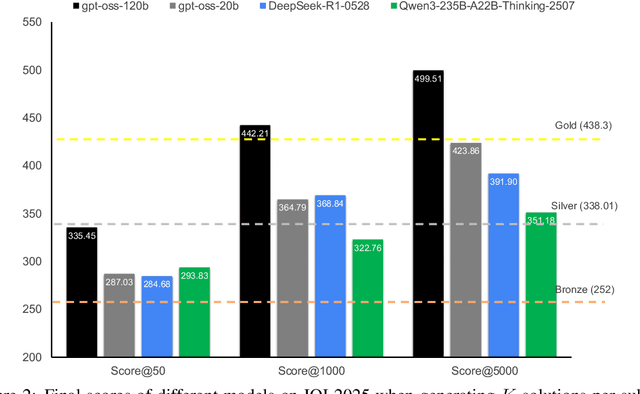

Abstract:Competitive programming has become a rigorous benchmark for evaluating the reasoning and problem-solving capabilities of large language models (LLMs). The International Olympiad in Informatics (IOI) stands out as one of the most prestigious annual competitions in competitive programming and has become a key benchmark for comparing human and AI-level programming ability. While several proprietary models have been claimed to achieve gold medal-level performance at the IOI, often with undisclosed methods, achieving comparable results with open-weight models remains a significant challenge. In this paper, we present \gencluster, a scalable and reproducible test-time compute framework that attains IOI gold-level performance using open-weight models. It combines large-scale generation, behavioral clustering, ranking, and a round-robin submission strategy to efficiently explore diverse solution spaces under limited validation budgets. Our experiments show that the performance of our proposed approach scales consistently with available compute, narrowing the gap between open and closed systems. Notably, we will show that GenCluster can achieve a gold medal at IOI 2025 for the first time with an open-weight model gpt-oss-120b, setting a new benchmark for transparent and reproducible evaluation of reasoning in LLMs.
NVIDIA Nemotron Nano 2: An Accurate and Efficient Hybrid Mamba-Transformer Reasoning Model
Aug 21, 2025



Abstract:We introduce Nemotron-Nano-9B-v2, a hybrid Mamba-Transformer language model designed to increase throughput for reasoning workloads while achieving state-of-the-art accuracy compared to similarly-sized models. Nemotron-Nano-9B-v2 builds on the Nemotron-H architecture, in which the majority of the self-attention layers in the common Transformer architecture are replaced with Mamba-2 layers, to achieve improved inference speed when generating the long thinking traces needed for reasoning. We create Nemotron-Nano-9B-v2 by first pre-training a 12-billion-parameter model (Nemotron-Nano-12B-v2-Base) on 20 trillion tokens using an FP8 training recipe. After aligning Nemotron-Nano-12B-v2-Base, we employ the Minitron strategy to compress and distill the model with the goal of enabling inference on up to 128k tokens on a single NVIDIA A10G GPU (22GiB of memory, bfloat16 precision). Compared to existing similarly-sized models (e.g., Qwen3-8B), we show that Nemotron-Nano-9B-v2 achieves on-par or better accuracy on reasoning benchmarks while achieving up to 6x higher inference throughput in reasoning settings like 8k input and 16k output tokens. We are releasing Nemotron-Nano-9B-v2, Nemotron-Nano12B-v2-Base, and Nemotron-Nano-9B-v2-Base checkpoints along with the majority of our pre- and post-training datasets on Hugging Face.
Llama-Nemotron: Efficient Reasoning Models
May 02, 2025



Abstract:We introduce the Llama-Nemotron series of models, an open family of heterogeneous reasoning models that deliver exceptional reasoning capabilities, inference efficiency, and an open license for enterprise use. The family comes in three sizes -- Nano (8B), Super (49B), and Ultra (253B) -- and performs competitively with state-of-the-art reasoning models such as DeepSeek-R1 while offering superior inference throughput and memory efficiency. In this report, we discuss the training procedure for these models, which entails using neural architecture search from Llama 3 models for accelerated inference, knowledge distillation, and continued pretraining, followed by a reasoning-focused post-training stage consisting of two main parts: supervised fine-tuning and large scale reinforcement learning. Llama-Nemotron models are the first open-source models to support a dynamic reasoning toggle, allowing users to switch between standard chat and reasoning modes during inference. To further support open research and facilitate model development, we provide the following resources: 1. We release the Llama-Nemotron reasoning models -- LN-Nano, LN-Super, and LN-Ultra -- under the commercially permissive NVIDIA Open Model License Agreement. 2. We release the complete post-training dataset: Llama-Nemotron-Post-Training-Dataset. 3. We also release our training codebases: NeMo, NeMo-Aligner, and Megatron-LM.
Nemotron-H: A Family of Accurate and Efficient Hybrid Mamba-Transformer Models
Apr 10, 2025

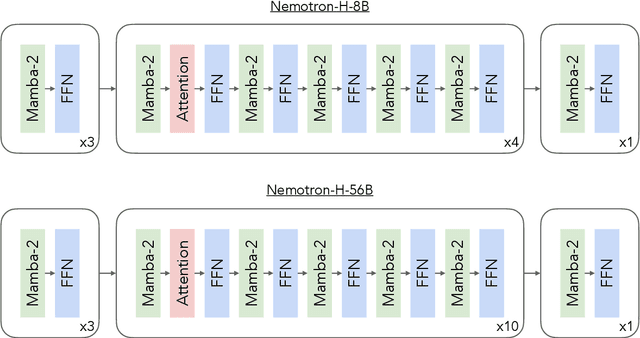
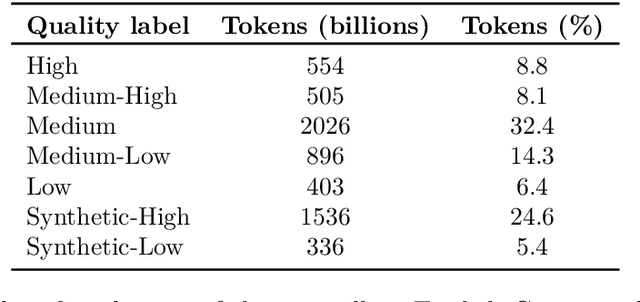
Abstract:As inference-time scaling becomes critical for enhanced reasoning capabilities, it is increasingly becoming important to build models that are efficient to infer. We introduce Nemotron-H, a family of 8B and 56B/47B hybrid Mamba-Transformer models designed to reduce inference cost for a given accuracy level. To achieve this goal, we replace the majority of self-attention layers in the common Transformer model architecture with Mamba layers that perform constant computation and require constant memory per generated token. We show that Nemotron-H models offer either better or on-par accuracy compared to other similarly-sized state-of-the-art open-sourced Transformer models (e.g., Qwen-2.5-7B/72B and Llama-3.1-8B/70B), while being up to 3$\times$ faster at inference. To further increase inference speed and reduce the memory required at inference time, we created Nemotron-H-47B-Base from the 56B model using a new compression via pruning and distillation technique called MiniPuzzle. Nemotron-H-47B-Base achieves similar accuracy to the 56B model, but is 20% faster to infer. In addition, we introduce an FP8-based training recipe and show that it can achieve on par results with BF16-based training. This recipe is used to train the 56B model. All Nemotron-H models will be released, with support in Hugging Face, NeMo, and Megatron-LM.
OpenCodeReasoning: Advancing Data Distillation for Competitive Coding
Apr 02, 2025Abstract:Since the advent of reasoning-based large language models, many have found great success from distilling reasoning capabilities into student models. Such techniques have significantly bridged the gap between reasoning and standard LLMs on coding tasks. Despite this, much of the progress on distilling reasoning models remains locked behind proprietary datasets or lacks details on data curation, filtering and subsequent training. To address this, we construct a superior supervised fine-tuning (SFT) dataset that we use to achieve state-of-the-art coding capability results in models of various sizes. Our distilled models use only SFT to achieve 61.8% on LiveCodeBench and 24.6% on CodeContests, surpassing alternatives trained with reinforcement learning. We then perform analysis on the data sources used to construct our dataset, the impact of code execution filtering, and the importance of instruction/solution diversity. We observe that execution filtering negatively affected benchmark accuracy, leading us to prioritize instruction diversity over solution correctness. Finally, we also analyze the token efficiency and reasoning patterns utilized by these models. We will open-source these datasets and distilled models to the community.
Genetic Instruct: Scaling up Synthetic Generation of Coding Instructions for Large Language Models
Jul 29, 2024
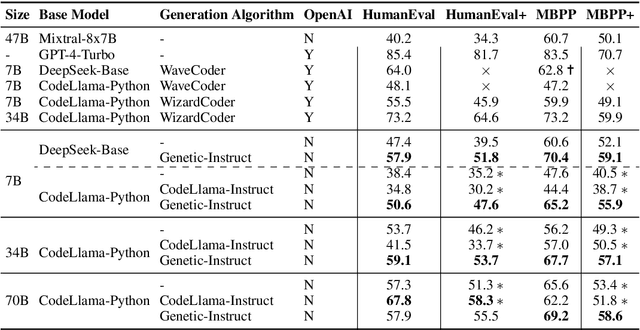
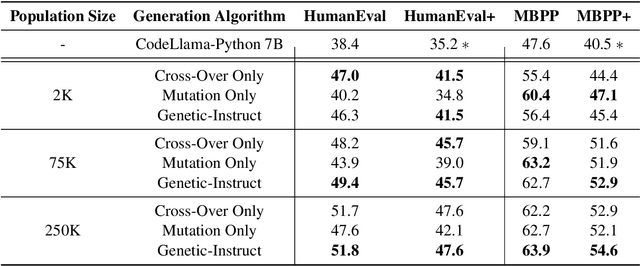
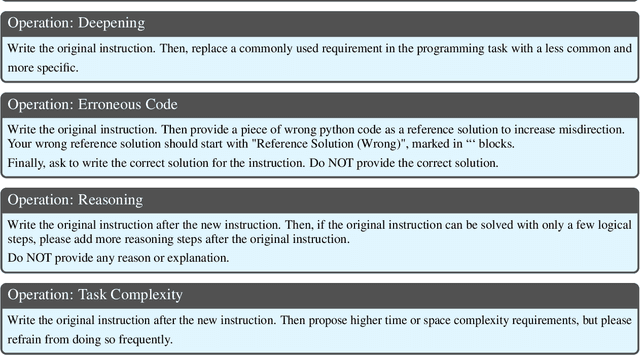
Abstract:Large Language Models (LLMs) rely on instruction samples for alignment, but creating these datasets poses challenges, particularly in expert-dependent tasks like coding, which can be cost-prohibitive. One approach to mitigate these challenges is synthesizing data using another LLM. In this paper, we introduce a scalable method for generating synthetic instructions to enhance the code generation capability of LLMs. The proposed algorithm, Genetic-Instruct, mimics evolutionary processes, utilizing self-instruction to create numerous synthetic samples from a limited number of seeds. Genetic-Instruct is designed for efficient scaling of the generation process. Fine-tuning multiple coding LLMs with the synthetic samples demonstrates a significant improvement in their code generation accuracy compared to the baselines.
Nemotron-4 340B Technical Report
Jun 17, 2024



Abstract:We release the Nemotron-4 340B model family, including Nemotron-4-340B-Base, Nemotron-4-340B-Instruct, and Nemotron-4-340B-Reward. Our models are open access under the NVIDIA Open Model License Agreement, a permissive model license that allows distribution, modification, and use of the models and its outputs. These models perform competitively to open access models on a wide range of evaluation benchmarks, and were sized to fit on a single DGX H100 with 8 GPUs when deployed in FP8 precision. We believe that the community can benefit from these models in various research studies and commercial applications, especially for generating synthetic data to train smaller language models. Notably, over 98% of data used in our model alignment process is synthetically generated, showcasing the effectiveness of these models in generating synthetic data. To further support open research and facilitate model development, we are also open-sourcing the synthetic data generation pipeline used in our model alignment process.
OpenMathInstruct-1: A 1.8 Million Math Instruction Tuning Dataset
Feb 15, 2024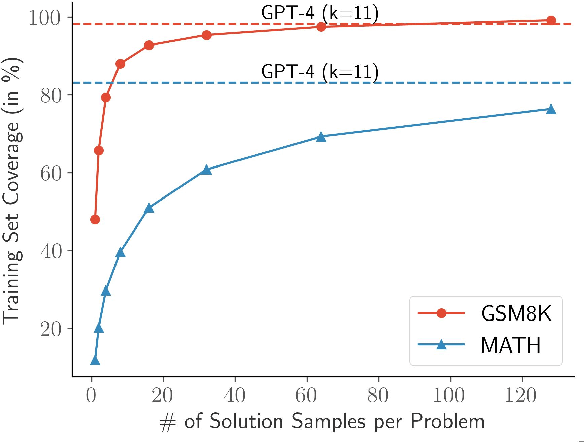

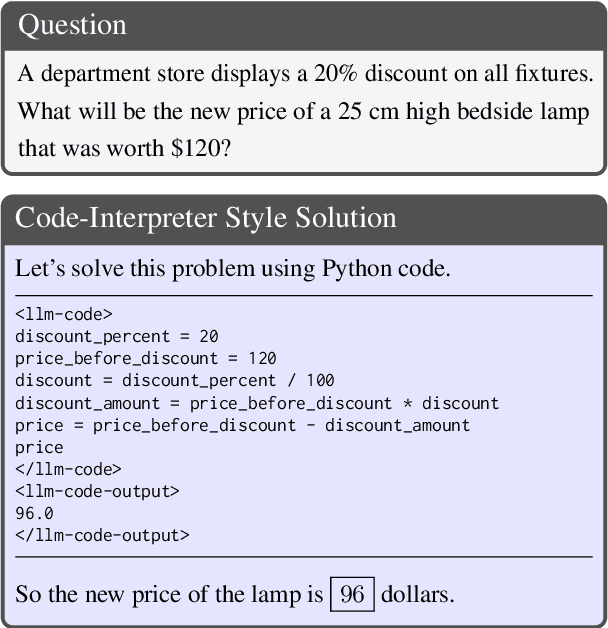

Abstract:Recent work has shown the immense potential of synthetically generated datasets for training large language models (LLMs), especially for acquiring targeted skills. Current large-scale math instruction tuning datasets such as MetaMathQA (Yu et al., 2024) and MAmmoTH (Yue et al., 2024) are constructed using outputs from closed-source LLMs with commercially restrictive licenses. A key reason limiting the use of open-source LLMs in these data generation pipelines has been the wide gap between the mathematical skills of the best closed-source LLMs, such as GPT-4, and the best open-source LLMs. Building on the recent progress in open-source LLMs, our proposed prompting novelty, and some brute-force scaling, we construct OpenMathInstruct-1, a math instruction tuning dataset with 1.8M problem-solution pairs. The dataset is constructed by synthesizing code-interpreter solutions for GSM8K and MATH, two popular math reasoning benchmarks, using the recently released and permissively licensed Mixtral model. Our best model, OpenMath-CodeLlama-70B, trained on a subset of OpenMathInstruct-1, achieves a score of 84.6% on GSM8K and 50.7% on MATH, which is competitive with the best gpt-distilled models. We release our code, models, and the OpenMathInstruct-1 dataset under a commercially permissive license.
 Add to Chrome
Add to Chrome Add to Firefox
Add to Firefox Add to Edge
Add to Edge